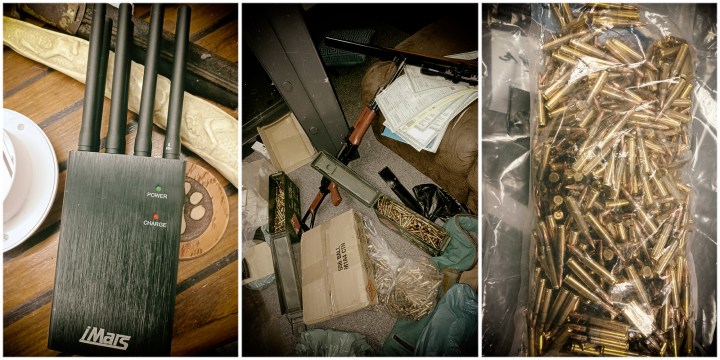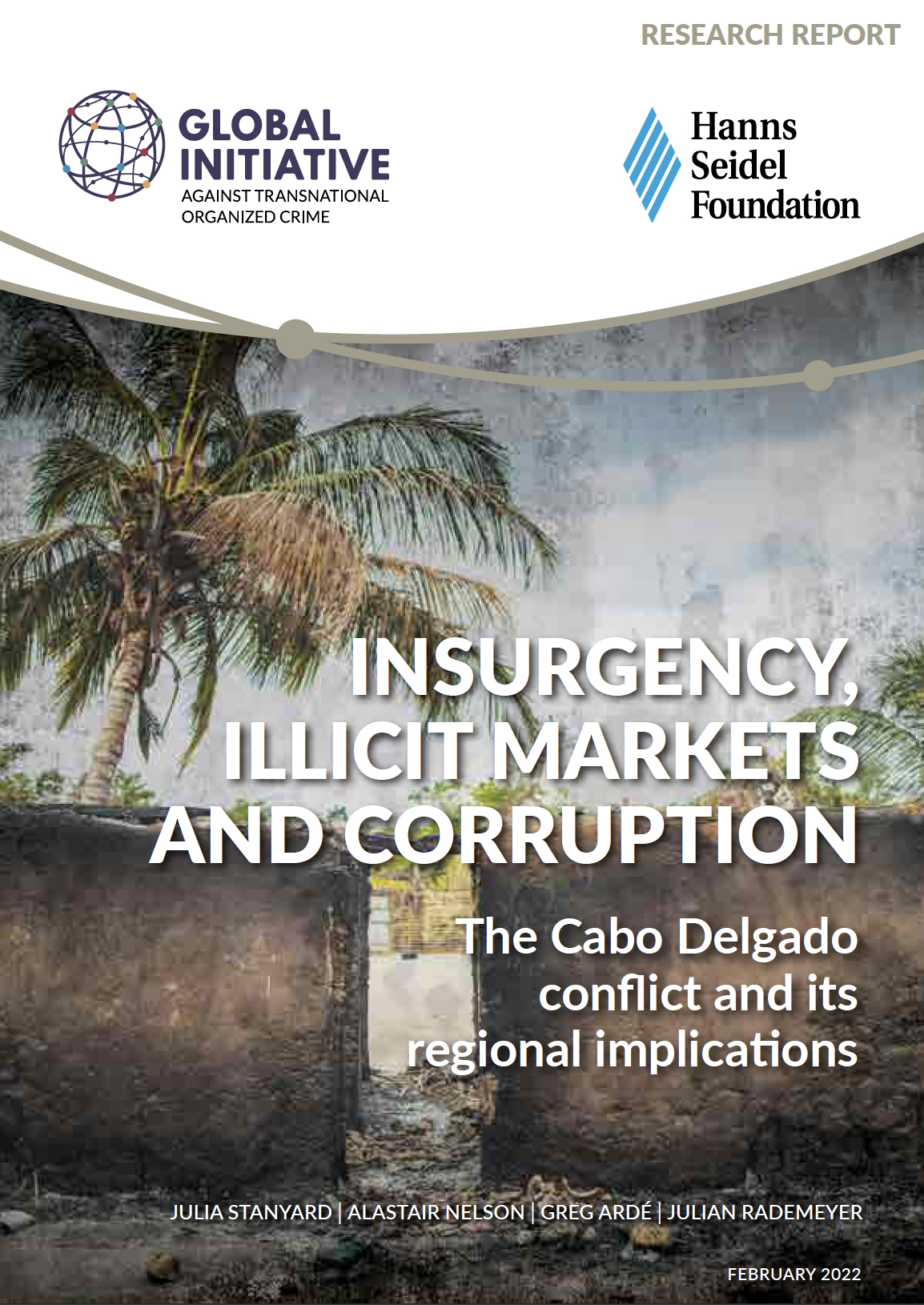ISIS OP-ED
Farhad Hoomer and the broader picture of Islamic State-linked cases in South Africa

Recent US sanctions imposed on a South African for alleged terrorism financing, as well as the ongoing IS-linked insurgency in neighbouring Mozambique, have put the spotlight on extremist networks within South Africa. While researchers say that the threat of Islamist networks in the country should not be overstated as they remain few in number, the capacity of police and prosecutors to do thorough investigations leaves much to be desired.
Durban businessperson Farhad Hoomer — accused by the United States of leading an “Isis cell” — denies being a terrorist but says his goal is the establishment of an Islamic caliphate and he is willing to take up arms to achieve his goals.
Hoomer, who was sanctioned by the US government this week, along with three other alleged Islamic State financiers, sees democracy as a form of “evil, tyranny and enslavement”.
“Will I fight for Sharia? I would say yes,” he said in an interview with the Global Initiative Against Transnational Organised Crime (GI-TOC).
“It is the best thing to take us out of slavery,” he added.
The US alleges Hoomer is the leader of an Islamic State cell in Durban and has been organising their activities there since 2017. Hoomer “recruited and trained cell members and was in contact with members of Isis-Democratic Republic of the Congo (Isis-DRC) and Isis supporters throughout South Africa”, the US Treasury said in a statement.

This article draws on research from the Global Initiative Against Transnational Organized Crime’s new publication, ‘Insurgency, illicit markets and corruption: The Cabo Delgado conflict and its regional implications’.
“Hoomer raised funds through kidnap-for-ransom operations and extortion of major businesses, which provided more than one million South African rand in revenue for his cell.”
In response, Hoomer told GI-TOC, “I am shocked and appalled by the United States’ unilateral decision to impose sanctions on me. I have never been convicted of any crime whatsoever and therefore no country has the right to sanction a person without evidence or due process.”
Hoomer and 11 associates were arrested following an attack on a Shia mosque in Verulam, Durban, in 2018. The mosque’s imam was murdered, his throat slit and two other people were stabbed. The accused were also linked to several incendiary devices planted at stores and markets around Durban in July 2018. The charges — which included terrorism charges and extortion of the stores where the devices were planted — were later dropped.
In June 2021, Hoomer was again arrested with four others at a warehouse in Mayville, Durban. Police seized over 5,000 rounds of ammunition and several firearms. This case was also dropped months later. Hoomer claimed the firearms charges laid against him were false: the guns and ammunition seized in Mayville, he claims, were for legitimate use in hunting.
Hoomer maintains his innocence and attorneys acting on his behalf have sent a letter of demand to the National Prosecuting Authority and police, claiming R156-million in damages from the State for alleged malicious prosecution.
The US designation of Hoomer tallies with views shared by South African law enforcement figures with GI-TOC in 2021. They alleged that Hoomer is a key leader of Islamist extremists in South Africa. An informed source in the NPA described him as “one of the big fish in the leadership”.
“There is a struggle for ascendancy among the radicals in South Africa to establish Islamic State here… We know he is an emir (of high rank or office) and he has generals under him… He is a critical role-player.”
Hoomer rejects the claims. “What makes them say I am a terrorist? The state has all my bank records, my cellphones and my computers. If they have proof that I am being funded or am funding someone, let them present it.”
He says he and other terrorism suspects in South Africa are being unfairly targeted by the State in an “injustice being perpetrated against Muslims”.
While on bail, Hoomer attended court appearances of others accused of terrorism charges — including Brandon-Lee and Tony-Lee Thulsie — which he claims was out of a sense of “fellow feeling” for their situation. The ‘Thulsie twins’, the first South Africans accused of Islamic State links upon their arrest in 2016, entered into a plea deal with the State in February 2022 and were sentenced to eight and 11 years in prison respectively.
The bigger picture: Islamic State-linked cases in South Africa
GI-TOC has analysed the commonalities between several Islamic State-linked cases in South Africa since 2015, including the allegations around Hoomer and his associates. This forms part of a new research report that looks into the Islamic State-linked insurgency in Mozambique, and the relationship between the conflict and organised crime and corruption in the country’s northern Cabo Delgado province, and its regional implications.
Our analysis found that there are several common links between these cases, including direct connections between the individuals alleged to be involved in terrorist activities. However, the available information does not prove that these different incidents were connected as part of a concerted extremist network.
There are also similarities in the modus operandi of different groups. Terrorism cases in South Africa tend to be focused on terrorist financing, including crimes such as extortion and kidnap for ransom or theft, in order to provide financial support to international jihadist activities, rather than directly carrying out terror attacks within South Africa itself.
The incidents linked to Islamic State that have emerged in South Africa since 2015 do not necessarily show an immediate, sustained threat of Islamic terrorism to the country.
In absolute terms, incidents linked to extremist Islamist ideologies are still relatively few. Some experts have argued that South Africa’s decision to not formally align itself with US-led counterterrorism policy, and not to deploy troops to counter Islamic terrorism in the past, has historically prevented it from becoming a target for extremist networks.
However, the recent cases that have been prosecuted, and the allegations levelled by the US against Hoomer and others, suggest that South Africa is instead being used as a “rear base” for training, concealment and fundraising for Islamist militants. This is not a new dynamic and has been acknowledged by South African state security sources in the past.
The case of Samantha Lewthwaite, a British national who was instrumental in planning the al-Shabaab attack on the Westgate Mall in Nairobi, provides a case in point. In 2014, Lewthwaite was discovered to have been living in South Africa, using a fake South African passport, since at least 2008.
Institutional weakness and lack of capacity
The institutions tasked with identifying, prosecuting and preventing terrorism cases in South Africa are fundamentally weak.
Investigators with close knowledge of Islamic State-linked groups told GI-TOC that South African authorities do not currently have enough technical and specialist capacity to deal with cases of this nature. An officer in the Hawks unit for Crimes Against the State expressed concerns that the unit is “seriously understaffed”, with only around 20 officers with the requisite knowledge and experience nationwide.
Several sources told GI-TOC that there is a single South African Police Service expert who analyses data seized in terror raids. The Verulam mosque attack investigation — in which Hoomer was charged — alone yielded five terabytes of data for analysis from 200 separate devices seized from the accused, creating an insurmountable task for the personnel available.
One senior NPA source told the GI-TOC: “It is ridiculous that one person [has to analyse this volume of data]. You should have a team of at least 15 people doing that. It is an impossible task. It is like asking me to get to the moon but then giving me a horse cart to get there. It is shocking. To study Isis, you need an entire team dedicated to online recruitment alone.”
This lack of investigative capacity has led to delays in prosecutions. The magistrate in the Verulam mosque attack prosecution criticised “unreasonable” delays, which led to the case being dropped. In October 2021, when the Thulsie twins appeared in court, the judge also slammed the delays in their trial as “preposterous”.
The Financial Action Task Force (FATF) — a global intergovernmental watchdog of money laundering and terrorist financing — published a report in October 2021 which said that “South Africa has failed to demonstrate that it is effectively identifying, investigating or prosecuting terrorist financiers or addressing terrorism finance through alternate measures”.
FATF noted that South Africa has only ever convicted one person involved in terrorism financing, while highlighting that South Africa has thousands of charitable and non-profit organisations with insufficient oversight, suggesting some might be at risk of terrorism financing abuse.
The new designations against alleged South African terrorism financiers by the US, as well as the ongoing IS-linked insurgency in neighbouring Mozambique, have put the spotlight on extremist networks within South Africa. However, it is essential that the actual threat of Islamist networks in the country is not overstated, as they remain few in number.
Members of the South African Muslim community have also been anxious to emphasise that reporting should not fall into lazy Islamophobic and alarmist tropes that equate isolated instances of extremism with the wide variance of interpretations of Islam practiced in South Africa for centuries.
What these cases do highlight, however, is the urgent need for continued efforts to support and strengthen institutions such as the National Prosecuting Authority, police and intelligence agencies and develop the specialist skills needed in law enforcement to investigate and prosecute terrorism cases.
Terrorism cases require significant manpower, cyber capabilities, specialist language skills, cultural knowledge and an understanding of militant ideology — capacities that should be developed to address future threats. DM
This article draws on research from the Global Initiative Against Transnational Organized Crime’s new publication, ‘Insurgency, illicit markets and corruption: the Cabo Delgado conflict and its regional implications’, by Julia Stanyard, Alastair Nelson, Greg Ardé and Julian Rademeyer. The research was supported by the German Hanns Seidel Foundation which works worldwide towards peace, democracy and development. The report is available at: https://globalinitiative.net/analysis/mozambique-cabo-delgado-conflict/
[hearken id=”daily-maverick/9226″]

















 Become an Insider
Become an Insider
If you are willing to take up arms against a democratically elected government, even an incompetent one like ours, means you are a terrorist; you will use violence and terror to achieve an aim. Terrifying that this pot is allowed to simmer away unmolested – we might discover a massive problem when it’s too late to control.